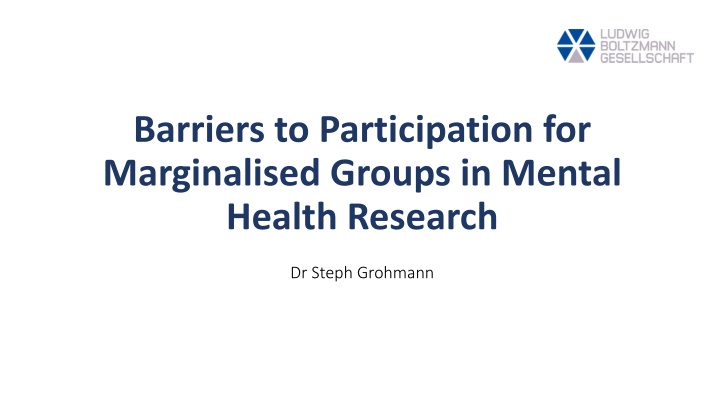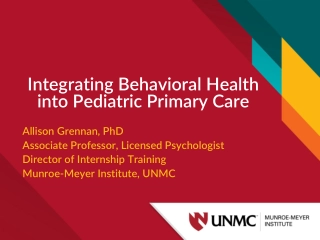
Barriers to Participation in Mental Health Research for Marginalised Groups
Explore the barriers faced by marginalised groups in participating in mental health research, including lack of resources, stigma, trust issues, and cultural disparities. Addressing these challenges is crucial for inclusive and effective research outcomes.
Download Presentation

Please find below an Image/Link to download the presentation.
The content on the website is provided AS IS for your information and personal use only. It may not be sold, licensed, or shared on other websites without obtaining consent from the author. If you encounter any issues during the download, it is possible that the publisher has removed the file from their server.
You are allowed to download the files provided on this website for personal or commercial use, subject to the condition that they are used lawfully. All files are the property of their respective owners.
The content on the website is provided AS IS for your information and personal use only. It may not be sold, licensed, or shared on other websites without obtaining consent from the author.
E N D
Presentation Transcript
Barriers to Participation for Marginalised Groups in Mental Health Research Dr Steph Grohmann
General Barriers to participation for marginalised groups People belonging to marginalised and/or vulnerable groups are less likely to take part in participatory research due to: Lack of access to resources (time, money, mobility, education ) Lack of access to information (how to participate, aims and objectives ) Lack of accessible participation formats (e.g. sign language translation) Power or resources differentials (within patient community and between patients and researchers) Inappropriate or insufficient incentives (e.g. monetary rewards whilst claiming benefits) Researcher bias/stereotyping Lack of researcher skill in outreach-based recruitment and involvement methods Lack of trauma-informed methodologies Consultation fatigue on part of patients as a result of negative experiences
Barriers to participation in mental health research In mental health research, additional barriers can prevent people with lived experience from participating in research: Mental health stigma (patients perceived as unreliable or lacking insight) Informed Consent challenges Issues with confidentiality in group settings Lack of trust due to negative experiences with services Lack of accessibility in PPIE activities (e.g. in-person meetings requiring travel only) Conflict within patient communities or between researchers and patients (e.g. controversial or politicised MH topics) Lack of researcher training and resources Neurotypical bias (e.g. expectation of small talk/eye contact at meetings)
Barriers to participation for Black people and PoC People who are racialised or who are marginalised due to their ethnicity may face additional barriers to participation: Structural and institutional racism extend into research and PPIE contexts Mistrust in medical research due to long history of abuses, betrayal and trauma Barriers to mental health care lead to lack of information Suspicion of being exploited or data mined without fair compensation and respect Resource and power imbalances between researchers and patients Lack of appreciation of differences between communities In mental health research also: Lack of cultural knowledge in MH research (e.g. culturally different interpretations of symptoms) In some communities, cultural taboos around mental health Racial stereotypes can impact (mis)diagnosis Compounding effect of mental health stigma and minority status Black African-, Asian- and Caribbean-heritage people remain significantly under-represented in our public involvement community (NIHR Race Equality Public Action Group)
(Some) ways to overcome these barriers For Formarginalised marginalisedgroups groupsyou youare arenot a not a member memberof of: : - Listen and double check interpretations with participants - Interpret as little as possible, communicate data as authentic as possible - Defer to lived experience - Acknowledge own positionality, complicity in structural racism and history of ethical misconduct in medical research For Formarginalised marginalisedgroups groupsyou youare area a member memberof of: : - Be open about experience without generalising to others - Speak as a peer, not an authority - Approach accessibility from a lived experience perspective, including in methods training - Acknowledge and manage difficult topics such as self harm - Recognise a crisis and have a response plan






















